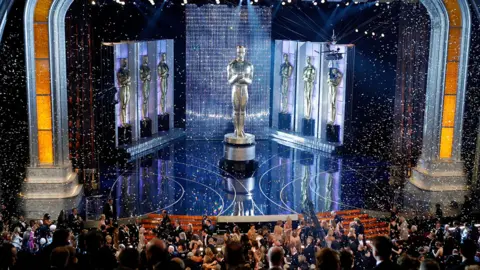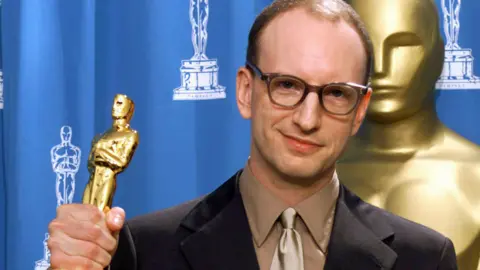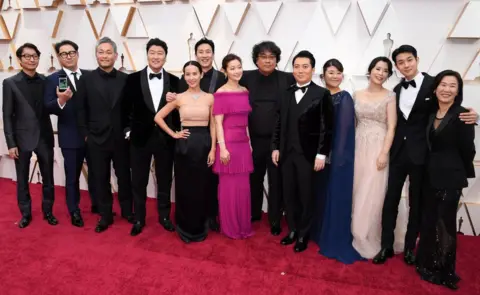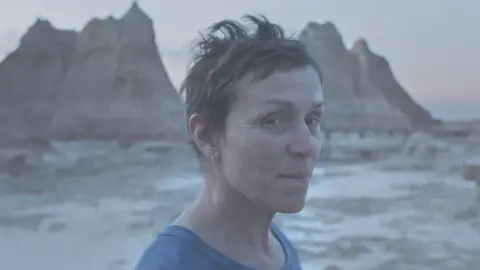Oscars 2021: What can we expect for the ceremony?
 Getty Images
Getty ImagesIt's on - but will the 93rd Academy Awards look anything like the Oscar ceremonies movie fans have come to expect?
The Academy of Motion Pictures, Arts and Sciences, which presents the Oscars, says it's exploring how to hold an in-person ceremony in Los Angeles on 25 April 2021, two months later than normal.
It's also asked Oscar-winning director Steven Soderbergh to "re-envision" the event in the light of the Covid-19 pandemic.
After the year it's endured, the film industry will be hoping the Oscar ceremony will be high-profile rather than low-key.
 Alamy
AlamyEven though TV viewing figures have declined in recent years, it's still the most talked-about entertainment event on the planet.
Twitter released analytics in 2014 showing that tweets about that year's ceremony were viewed 3.3 billion times around the world. It included a celebrity-filled selfie posted by Oscar host Ellen DeGeneres, which became the most retweeted image in Twitter's history - even briefly crashing the service.
Allow X content?

The Academy has a host of virtual ceremonies, such as this year's Emmy Awards, to draw on for inspiration should it need to go online, or create a hybrid event.
The recent European Film Awards, traditionally the last awards ceremony of the year, was held this month as an event from Berlin's Futurium building - with a few people inside hosting the awards, and the winners congratulated online.
"We decided to do it properly or we weren't going to do it at all," explains Irish film producer Mike Downey, the Chair of the European Film Academy.
"Since even the German Chancellor Angela Merkel made an appearance, albeit virtually, it was a tightly run ship. Every single person in the building was tested every day up to the event, masks had to be worn apart from on stage, absolute social distancing was compulsory. There was also a full rehearsal. There's nothing worse than a bad advertisement to the world."
![Getty Images Thomas Vinterberg [pictured with producer Kasper Dissing]](https://ichef.bbci.co.uk/news/480/cpsprodpb/1523D/production/_116198568_efas.jpg.webp) Getty Images
Getty ImagesThe only thing that let them down, Downey adds, was one internet connection to rural France, "so the nominated director was on the line, but his face couldn't be."
Downey says that the purpose of an awards ceremony right now, "is to demonstrate that cinema is still alive, and to paraphrase a quote, reports of its demise have been greatly exaggerated."
Studios and filmmakers, who rely on an Oscar nomination to increase box office for their movies, agree that a high-profile awards event is a valuable boost.
Even though the so-called "Oscar bounce" for a best picture has decreased over the last decade, data analytics company Comscore has statistics showing that the box office for Bong Joon-Ho's Parasite jumped by 79% the weekend after its best picture nomination.
 Curzon
CurzonDanish director Thomas Vinterberg, who won four European Film Awards for his drinking drama Another Round, starring Mads Mikkelsen, hopes that it might also secure a best international film Oscar nomination.
"It's elevating and supportive and super-important," he says. "It's happened once before to me with the film The Hunt, and it's a joyful ride when it happens, and I'm hoping this will happen again.
"Whether you're talking about Cannes Film Festival, the European Film Awards or the Oscars, I find a great deal of bravery in what all these organisations are trying to do at this time. They're fighting for the cinema to demand attention, to create a glamour around the experience and to create heroes and heroines for the world.
"They deserve a standing ovation for it."
 Shutterstock
ShutterstockHowever, from nomination to Academy Award, it is usually a whirlwind of international travel, parties, photo-calls and other red carpets for would-be winners, as they lobby for consideration.
Even if the Oscars does manage a physical ceremony by April, the build-up will be far less visible.
Florian Zeller's The Father, which has six British Independent Film Awards nominations, is expected to be in the running. It's a critically-acclaimed portrayal of dementia, starring Sir Anthony Hopkins and Olivia Colman.
Though the film had a premiere at the Cairo International Film Festival this month, Zeller, a first-time French filmmaker, couldn't attend, and he knows that promotion for the film won't be what he dreamed of.
"Yes, it's not what I was expecting," he says, "but this year you have to expect nothing, because it's always surprising you. I hear the film is well-received by people who have seen it, but I'm not going to expect anything more than feeling joy, right here from my office."
 Carlos Somonte/Netflix
Carlos Somonte/NetflixWhen it comes to the 2021 Academy Award nominations, there's one contender that's benefited from audiences being at home in 2020.
The LA Times estimated that Netflix spent up to $30m (£22m) on promotion for Alfonso Cuaron's movie Roma - which did not lead to a best picture victory. Nor did it succeed with Martin Scorsese's $159m (£117m) epic The Irishman.
But this year it has a host of high profile releases, including George Clooney's sci-fi drama The Midnight Sky, David Fincher's film about the making of Citizen Kane, Mank, Spike Lee's war drama Da 5 Bloods, and the international rights to Tom Hanks's western News of the World, directed by Paul Greengrass.
It's also made the musical, The Prom, starring Meryl Streep, Nicole Kidman, James Corden and Kerry Washington, which is tipped for the Golden Globes, another Oscar predictor. It's about a teenager who wants to take her girlfriend to her high-school prom, and its message of joy in diversity, might, Streep hopes, be perfect for 2020.
 Netflix
Netflix"It's a big embrace of a film," she says of it. "And boy, do we need it at this time in the world. The young people in it lift the roof with their exuberance and joy and love of being alive. Whatever your sadness is, it's irresistible when people start to dance."
The combination of Bong Joon-Ho's four Oscars for Parasite - the first film not in the English language to win best picture - and more than 800 new Academy voters in 2020 may affect the nominations list. Forty-five percent of the "class of 2020" are women, and 36% aren't white.
It might mean a female director, Chloe Zhao, will be in contention for a best director prize for her acclaimed film Nomadland, starring Frances McDormand.
 Searchlight Pictures
Searchlight Pictures"I think it's Nomadland versus Netflix," says film critic Kaleem Aftab.
"And I think that Nomadland is going to win. Not because of anything other than it is by far the best film, and the same way that Parasite was the best film last year. I think that might be the change that we're seeing in Oscars, is that the 'boys' club' has ended. It could beat the big power studio, which Netflix has become."
Like many, Aftab hopes the Oscars will be held in person.
"A physical event would announce that we're in to a new era and we can finally go back to cinemas, and that we might see the big blockbusters come out. I feel that we know when that happens, the vaccine has had its impact, and we can go back to having normal lives."
BBC Talking Movies' full Review of 2020 is on BBC World News from 26 December 2020, and on BBC News Channel and BBC iPlayer from 2 January 2021.
